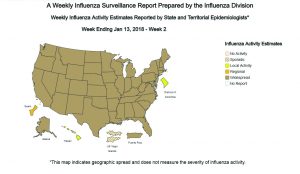Flu season hitting hard – expected to continue
By Amber McIver-Traywick
The Surveyor
Flu season has been particularly brutal across the U.S., as this year’s most prevalent strain, Influenza A (H3N2) is associated with a high occurrence of hospitalization. The Centers for Disease Control (CDC) is reporting that as of Oct. 1 there have been 2,055 hospitalized influenza cases in the state of Colorado, and the flu is now considered wide-spread in 49 states (Hawaii only has local activity). One pediatric death has also been reported in the state of Colorado, with a total of 30 pediatric deaths reported nation-wide. Larimer County has a crude rate of reported influenza-associated hospitalizations of between 39.4 and 62.8 cases per 100,000 persons. 
The flu typically has a fairly quick onset of symptoms, which can include congestion (less common with the flu), cough, runny or stuffy nose, itchy or watery eyes, sore throat, headache, extreme fatigue, body aches, and a low fever. The key difference between a cold and influenza is the severity and often times how quickly the illness comes on. A cold tends to start slowly and gradually and will get worse over a few days. You tend to feel bad with cold symptoms, but they usually aren’t severe enough to disrupt your life. The flu tends to hit all at once with more extreme symptoms, rendering you unable to go about your daily routine.
The H3N2 strain is linked with more severe illnesses, especially among adults over 65 and children younger than 5. According to the CDC, during a bad flu season as many as 56,000 deaths are connected to the flu.
The flu typically lasts between four and five days, although symptoms can last anywhere from two to seven days. Complications from the flu include pneumonia, ear infections, sinus infections, and worsening of other chronic medical conditions like asthma, heart failure or diabetes.
Seeking medical attention from your primary care physician is recommended as soon as possible if you believe you have contracted the flu, as antiviral medications are only effective within one to two days after contracting the virus. If you are having any trouble breathing, have chest pain, or are extremely lethargic, it’s recommended you immediately seek emergency medical attention.
According to the Colorado Department of Public Health & Environment (CDPHE) the number of flu cases is three to four times higher than what has been reported in previous years. There have also been 32 outbreaks in long-term care and residential facilities statewide since Oct. 1, what is considered the beginning of the flu season.
February historically has been when flu season peaks, so there are several more weeks before an end may be in sight.
CDPHE recommends sticking with some of the basics to help keep you and your family healthy during cold and flu season. These include: frequent and thorough hand-washing, avoiding touching your face or eyes, making a point to cover your face and mouth when you sneeze or cough with your arm and not your hands, and avoid contact with people who are sick. If you are prescribed medication, be sure to take it as instructed for maximum effectiveness, and stay home if you are sick, as flu can be spread just by exhaling. The CDC and the CDPHE recommend flu vaccinations for anyone over the age of 6 months.
- January, 04 2024

Nominations open for Berthoud town b...
By Will Cornelius The Surveyor On Tuesday, nominations opened for candidates considering running for the...
- January, 18 2019

State Senator Rob Woodward introduces...
By Dan Karpiel The Surveyor Newly-elected Colorado State Senator Rob Woodward (R-Loveland), who represents Berthoud...
- January, 24 2020

Health warnings for Larimer County an...
Photo courtesy of CDC.gov - Electron microscope image of SARS a virus in the coronavirus...
- August, 02 2018

Arrest made after car pursuit in Bert...
Special to the Surveyor On Wednesday morning, 8/1/18, at about 8 a.m., the Larimer County...
- November, 01 2023

Turner Middle School’s Jessica May na...
Photo by Will CorneliusTurner Middle School’s Jessica May was named the...
- June, 19 2020

Larimer County Commissioner Candidate...
By Dan Karpiel Myles Baker The Surveyor The Surveyor reached out to all 10 of...

Unified basketball comes to Turner Middle School
Community News

Mike Grace says goodbye as Brett Wing joins town board
Community News
POLICEBLOTTER
Community News
Northern Water sets C-BT quota at 70% for 2024
Community News

Emotions run high during Revere Property hearing
Community News
Snowpack at 119% above normal
Community News

Karspeck to serve third term as Berthoud mayor
Community News
COMMUNITY CALENDAR:
Community Calendar – add an event
Homestead Fine Art Gallery First Fridays OPEN HOUSE
03 May 4:00 PM - 7:00 PM
Homestead Fine Art Gallery First Fridays OPEN HOUSE
07 Jun 4:00 PM - 7:00 PM
Homestead Fine Art Gallery First Fridays OPEN HOUSE
05 Jul 4:00 PM - 7:00 PM
Homestead Fine Art Gallery First Fridays OPEN HOUSE
02 Aug 4:00 PM - 7:00 PM
Homestead Fine Art Gallery First Fridays OPEN HOUSE
06 Sep 4:00 PM - 7:00 PM
Homestead Fine Art Gallery First Fridays OPEN HOUSE
04 Oct 4:00 PM - 7:00 PM

